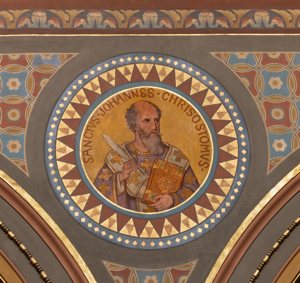
St. Chrysostom, the fourth century Archbishop of Constantinople and doctor of the Church, thundered away at his congregation one Sunday morning.
There had been a recent influx of immigrants to the city, and the municipal authorities were setting up homeless shelters for them. But, surprisingly, the saint’s exhortation was not that his congregation should join the work, but rather that they should stay away from it.
Why? What could possibly be wrong with that? Wasn’t it just the obvious Christian thing to do?
Well, yes and no. For St. Chrysostom told them what the even more Christian thing would be to do: Take the refugees into their own homes — into what was then called their “Christ rooms.” This was a room in each household set apart to receive Christ in the poor. St. Chrysostom was concerned that if they started “outsourcing” the homeless to the shelters, they would lose the habit of Christian hospitality.
Last month, as a way of continuing to introduce the main ideas of the Catholic Worker Movement, I wrote about Peter Maurin’s insistence that daily community life is essential to Catholic discipleship. This month, I want to highlight another part of that shared life — what Maurin called “personalism”: the call to act directly and personally to form relationships, organize community, care for others and practice the Gospel, without waiting for the state, or charitable institutions, or professionals to do it for us.
As a Catholic, Maurin saw that this freedom was necessary for the flourishing of both Christian virtue and community. For virtue, because it is only by our own personal, intentional acts that we become more Christ-like. For community, because the Church is more than just going to Mass — it’s the laity freely deciding to live intentionally together daily, in a way that our clergy cannot possibly plan out for us.
Personalism, for Maurin, is taking the initiative to simply start living the Gospel right now, without waiting for a blueprint or permission. It’s what St. Chrysostom wanted from his congregation.
Yet it is certainly not the philosophy of our day. Rather, Maurin worried, we increasingly look to the state and to institutions to do our living for us. We have long been witnessing the growth of an impersonal world where nearly every facet of life is taken up into a professional organization and subjected to formal, bureaucratic processes and procedures. And over time, Maurin saw, this hyper-institutionalization makes autonomous, personal action, like the kind St. Chrysostom was calling for, increasingly difficult for us to imagine.
When we get used to living through institutions, making our own decisions in light of the Gospel can become foreign to us. We come to wonder if we can, or even if we should, think for ourselves and act freely, outside of an agency with a board and five-year plan. We increasingly become a culture of people who feel we must be supervised, that we don’t count, and that we’re not competent, unless we’re administered by a professional who will manage what we do, keep track of us, and make sure we are plugged in, in the right way, to the system.
Now, let’s be clear that Maurin was not taking issue with any particular institution, much less issuing a blanket condemnation of all institutions. He saw that many continued to be useful and good, and he himself advocated forming properly Christian institutions that really would aid virtue and community formation. And Maurin was, after all, a faithful Catholic, for whom the Church was a — divine! — institution. So, the problem was not the institutions themselves.
His worry was about the way that, today, institutions and the institutional mindset have become pervasive. He saw that their formal, calculating, impersonal way of proceeding can dominate our imagination, make us automatons of the status quo, and stifle our ability to freely practice the Gospel by meeting God in the poor and in creative community.
Personalism is Maurin’s response to this. It’s a call for a Christianity that puts people first and asks about the consequences later; for a Church with a do-it-yourself laity that at the same time clings resolutely to its clergy, the Church’s teaching and the sacraments.
Like St. Chrysostom, Maurin was calling for an active Church that didn’t outsource discipleship, but that brings the radical practice of the Gospel right into our homes. That’s the challenge of personalism today.
Miller is director of pastoral care and outreach at Assumption in St. Paul. He lives with his family at the Maurin House Catholic Worker community in Columbia Heights. You can reach him at colin.miller1@protonmail.com.



